Remington Premier Bismuth Waterfowl 12 Gauge 3" #5 1.37 oz – 25rds – R20501 For Sale
$54.99
The Remington Premier Bismuth Waterfowl 12 Gauge 3″ #5 1.37 oz – 25rds (R20501) ammunition is designed to enhance hunting performance with its innovative Premier Bismuth line. This ammunition is adaptable for various shotguns and suitable for all types of avian game. Featuring HEVI BISMUTH, it offers superior density compared to steel, enabling longer shooting distances without loss of energy or performance. The increased density allows for smaller shot sizes, increasing pellet count per shot, and improving targeting precision and success rates in hunting. Ideal for both upland game and waterfowl hunting in diverse terrains such as open prairies or flooded timber, these cost-effective shells promise a more efficient and successful hunting experience.
Can you shoot bismuth at waterfowl?
Yes, you can use bismuth shot for hunting waterfowl. Bismuth is a popular alternative to lead shot because it is non-toxic and permissible for waterfowl hunting under U.S. Fish and Wildlife Service regulations.
Why are bismuth cartridges so expensive?
Bismuth cartridges are expensive for several reasons:
1. **Material Cost**: Bismuth is more costly than lead, which is traditionally used in ammunition. Its higher material cost directly impacts the price of bismuth cartridges.
2. **Production Process**: Manufacturing bismuth cartridges is more complex and costly. The metal’s properties require specialized production techniques to handle its brittleness and ensure proper performance.
3. **Demand and Availability**: Bismuth is not as abundant as other materials, leading to higher costs. Additionally, the demand for non-toxic alternatives to lead-based ammunition has increased prices.
4. **Environmental and Regulatory Factors**: Bismuth is often used as a non-toxic alternative to lead, complying with environmental protection regulations in certain regions. Meeting these regulatory standards can increase production costs.
5. **Performance Benefits**: Bismuth offers performance advantages, such as being safe for use in older shotguns and providing similar shot density and power to lead. These benefits can justify higher prices.
These factors combine to make bismuth cartridges more expensive than other types of ammunition.
Is bismuth better than lead?
The comparison between bismuth and lead depends on the context in which you are comparing them. Below are a few different aspects to consider:
1. **Environmental Impact**: Bismuth is often considered more environmentally friendly than lead. It is non-toxic and can be used as a substitute for lead in various applications, such as shot for hunting, to reduce environmental and wildlife impact.
2. **Toxicity**: Lead is highly toxic to humans and animals, causing neurological and other health issues. Bismuth, on the other hand, is one of the least toxic heavy metals and is often used in medications such as Pepto-Bismol for treating digestive issues.
3. **Applications and Usage**:
– **Lead**: Commonly used in batteries, radiation shielding, and some types of ammunition. However, its use is being reduced due to health and environmental concerns.
– **Bismuth**: Used in pharmaceuticals, cosmetics, and as a lead substitute in free-machining alloys and some ammunition.
4. **Economic Factors**: Lead is generally cheaper and more abundantly available than bismuth, which might make it more economically viable for certain industrial applications.
5. **Physical Properties**: Lead is denser and has a lower melting point than bismuth, which might make it more suitable for specific applications, such as radiation shielding or battery manufacturing.
In summary, if the concern is environmental impact and toxicity, bismuth is typically considered better than lead. However, for certain industrial applications where cost and specific physical properties are more critical, lead might be preferred. The “better” element depends on the specific criteria or application you are considering.
Is TSS better than bismuth?
To determine whether TSS (Tri-Sodium Sulfate) is better than bismuth, it’s important to specify the context or criteria for comparison. TSS and bismuth are used in different applications:
1. **TSS (Tri-Sodium Sulfate)**:
– Typically used in applications like dyeing in textiles, as a laxative in medical settings, or possibly in cooking (as a food additive).
– Its effectiveness and benefits would largely depend on the specific use case.
2. **Bismuth**:
– Commonly used in medicine, particularly as bismuth subsalicylate, for treating upset stomach, indigestion, nausea, and diarrhea.
– Also used in some cosmetic and industrial applications.
**Comparison**:
– **Medical Use**: If comparing for a medical use such as treating stomach issues, bismuth subsalicylate would likely be preferred, as TSS does not have these properties.
– **Industrial Use**: In industrial applications, the choice would depend on the specific needs of the process, such as whether you need a sulfate compound or a heavy metal with particular properties.
Overall, “better” depends largely on the specific application and the desired outcome. If you have a specific context in which you’re comparing these two substances, please provide more details for a more tailored answer.
Can I shoot bismuth through a full choke?
Yes, you can shoot bismuth through a full choke. Bismuth is softer than steel, so it is less likely to damage the barrel or choke. However, it’s always a good idea to check the manufacturer’s recommendations for your specific shotgun and choke to ensure compatibility and safety.
What is the only legal gun that can be used to take waterfowl?
The only legal firearm that can be used to take waterfowl in the United States is a shotgun that is not larger than 10-gauge. Additionally, the shotgun must be plugged to a maximum capacity of three shells, which includes the chamber and magazine combined. This ensures compliance with federal regulations for waterfowl hunting.
Can you shoot bismuth in old shotguns?
Yes, bismuth is generally considered safe for use in older shotguns. It is softer than steel, making it less likely to damage the barrels of older guns, which may not be designed to handle the higher hardness of steel shot. However, it’s always a good idea to consult the shotgun’s manufacturer or a gunsmith to ensure compatibility with specific firearms before use.
How much does a pound of bismuth cost?
As of the latest data, the price of bismuth is typically around $3 to $10 per pound. However, prices can vary depending on market conditions, location, and supplier. For the most accurate and current pricing, it’s best to check with commodity market reports or suppliers.
What size bismuth shot for geese?
For hunting geese, bismuth shot sizes ranging from BB to 2 are typically recommended. These sizes provide the necessary heft and energy to effectively bring down larger birds like geese. Always ensure compliance with local regulations and guidelines regarding shot size and hunting practices.
Can you mix lead and bismuth?
Yes, you can mix lead and bismuth. These two metals can form an alloy when combined. Lead-bismuth alloys have been used in various applications, such as in lead-bismuth eutectic (LBE) mixtures that are used in nuclear reactors as coolant materials because of their excellent thermal conductivity and relatively low melting points. However, when dealing with any metals, it is important to take into consideration their properties and the purpose for which the alloy is intended. Always ensure proper handling and safety precautions, as lead can be toxic.
What size shot of bismuth to lead?
To provide a helpful answer, I need more context. Could you clarify what you mean by “size shot of bismuth to lead”? Are you asking about ammunition for a specific application or a different aspect related to these materials? Please specify the context or details, and I’ll do my best to assist you.
What is a cheap alternative to lead shot?
A cheap alternative to lead shot is steel shot. Steel shot is less toxic to the environment and often more affordable than other non-toxic options like bismuth or tungsten shot. While steel shot is lighter and may require minor adjustments in shooting technique, it is widely used in hunting and shooting sports as a cost-effective and environmentally friendly substitute for lead shot.
Is bismuth more expensive than lead?
Bismuth is typically more expensive than lead. While prices can fluctuate due to market conditions, lead is generally more abundant and used in higher quantities for industrial purposes, making it less expensive. Bismuth, being less common and used in specialized applications, typically commands a higher price. For the most current and specific pricing, checking a commodities market report or financial news is recommended.
What are the benefits of bismuth shot?
Bismuth shot, used primarily in shotgun ammunition, offers several benefits:
1. **Non-Toxic**: Bismuth is non-toxic, making it an environmentally friendly alternative to lead. This is particularly important in wetland and wildlife areas where lead poisoning can harm birds and other wildlife.
2. **Density**: Bismuth is denser than steel, allowing for better energy retention and improved penetration, which enhances effectiveness over longer distances.
3. **Softness**: Bismuth is softer than steel and similar to lead, reducing the risk of barrel damage in older shotguns designed for lead shot.
4. **Performance**: Bismuth shot can mimic the ballistic performance of lead, providing effective patterns and energy transfer, which is beneficial for hunters transitioning from lead to non-toxic options.
5. **Legal Use**: Bismuth is approved for waterfowl hunting in areas where lead shot is restricted, allowing hunters to comply with regulations without compromising performance.
What is special about bismuth?
Bismuth is special for several reasons:
1. **Low Toxicity**: Unlike its periodic table neighbors, lead, and polonium, bismuth is non-toxic, making it environmentally friendly and safe for various applications, including in pharmaceuticals and cosmetics.
2. **Heavy Metal with Low Density**: Though it is one of the heaviest elements that is not radioactive, bismuth expands upon solidification, which is unusual for metals. This property is shared with water and makes it useful in casting and molding applications.
3. **Colorful Oxidation**: Bismuth oxide forms a unique iridescent layer that reflects a rainbow of colors, making bismuth crystals visually striking and popular among collectors and jewelry makers.
4. **Biocompatibility**: Due to its low toxicity, bismuth is used in medical procedures and products, such as in bismuth subsalicylate (the active ingredient in Pepto-Bismol) and as a substitute for lead in free-machining alloys where environmental concerns are a priority.
5. **Radioactive Stability**: Bismuth-209, the most common isotope, was long thought to be stable; however, it has been discovered to be slightly radioactive with a half-life much longer than the age of the universe, so it remains effectively stable.
These unique properties make bismuth useful and interesting in various scientific, industrial, and aesthetic contexts.
Be the first to review “Remington Premier Bismuth Waterfowl 12 Gauge 3" #5 1.37 oz – 25rds – R20501” Cancel reply
Related products
Remington Premier Bismuth Waterfowl
Remington Premier Bismuth Waterfowl 12 Gauge 2.75" #2 1.25 oz – 25rds – R20503
Remington Premier Bismuth Waterfowl
Remington Premier Bismuth Waterfowl 12 Gauge 3" #2 1.37 oz – 25rds – R20500
Remington Premier Bismuth Waterfowl
Remington Premier Bismuth Waterfowl 20 Gauge 3" #5 1.25 oz – 25rds – R20508
Remington Premier Bismuth Waterfowl
Remington Premier Bismuth Waterfowl 16 Gauge 2.75" #4 1.12 oz – 25rds – R20511
Remington Premier Bismuth Waterfowl
Remington Premier Bismuth Waterfowl 20 Gauge 2.75" #5 0.87 oz – 25rds – R20509
Remington Premier Bismuth Waterfowl
Remington Premier Bismuth Waterfowl 12 Gauge 2.75" #5 1.25 oz – 25rds – R20505
Remington Premier Bismuth Waterfowl
Remington Premier Bismuth Waterfowl 28 Gauge 2.75" #4 0.87 oz – 25rds – R20513
Remington Premier Bismuth Waterfowl
Remington Premier Bismuth Waterfowl .410 Gauge 3" #4 0.56 oz – 25rds – R20514
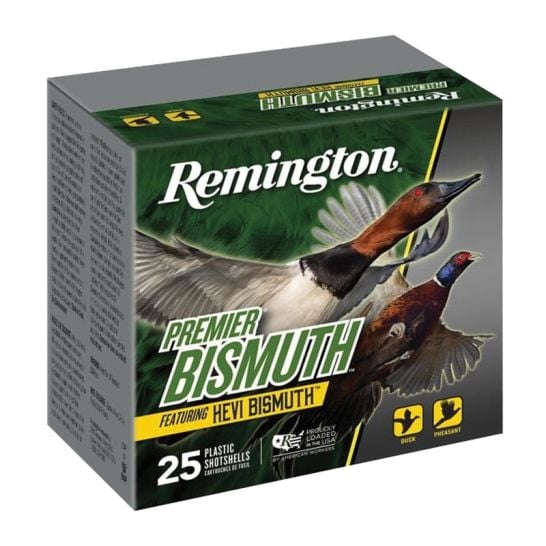


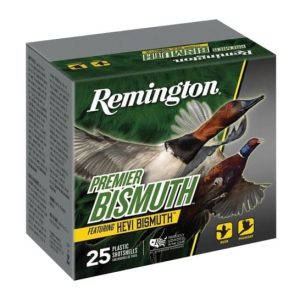
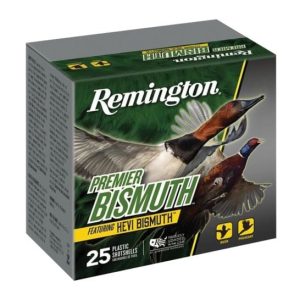
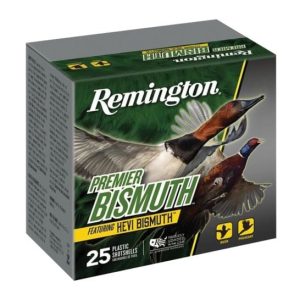
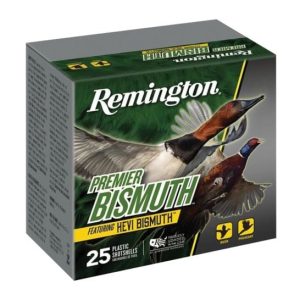
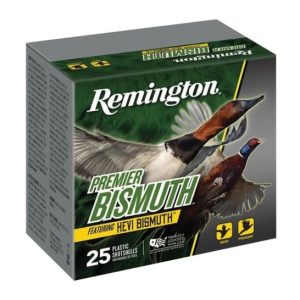
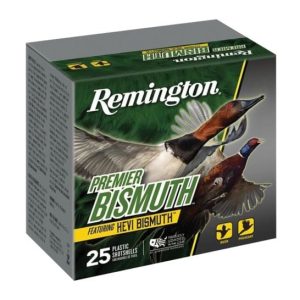
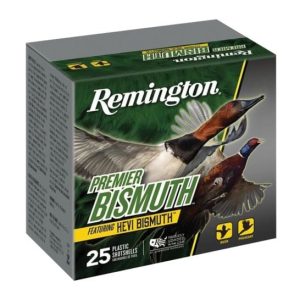
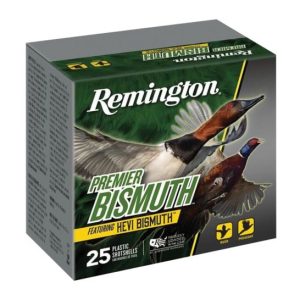
Reviews
There are no reviews yet.